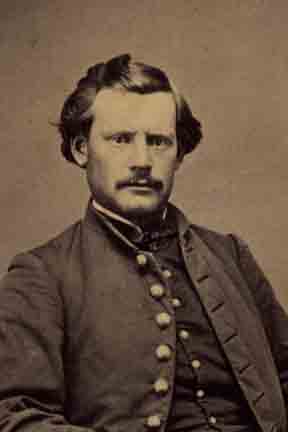Photos
Misconceptions about Silas
The Doy Rescue
Anecdotes
Family statistics
The Cutler Letters : Fact or Fiction?
Coal Creek Library
Related Books

Silas Stillman Soule
Silas Soule was born into an abolitionist family in Woolwich, Maine. His several-great grandfathers included George Soule and John Alden, passengers on the Mayflower in 1620. His father, Amasa, was self-educated, and a cooper, but had a love of words, and held strong anti-slavery beliefs. His first son was named after the editor of The Liberator, William Lloyd Garrison. Sometime about 1850 the family moved from Maine to Chelsea, Massachusetts. Silas' sister Annie tells of the excitement of reading the serial story of Uncle Tom's Cabin, and in her opinion it was this story that convinced her father to go to Kansas to help make it a free state. In the fall of 1854 Amasa and William left Massachusetts for Kansas to the newly founded Lawrence, arriving in November. They took a claim on Coal Creek, a few miles south of town. That next fall, Mrs. Soule and the remaining children, Silas, age 17, Emily age 15, and Annie, 13 arrived at Coal Creek. Because the winter was harsh and they were sick, the three women moved back East, leaving the men to fight for the cause of freedom. John Brown was a friend of the family, and the Soule home was a stop on the underground railway. In 1859 Silas was involved in the rescue of an anti-slavery man, Dr. John Doy, from the jail in St. Joseph, Missouri. Later that year the young people of the Coal Creek community decided they needed some recreation, and established the Coal Creek Social Library Association. They met every two weeks in someone's home for games, songs and readings, and collected money to start a library. The Coal Creek Library still exists in the village of Vinland, and is the oldest continuously operating library in Kansas. As of the fall of 2011 one could still visit the library on a Sunday afternoon and be guided by librarian Martha Smith, grandniece of Silas Soule. Martha has been doing librarian duties since August 1926, and has now reached her one hundred seventh birthday as of September 2012.
After John Brown was hanged, Dec. 2, 1859, Silas took part in an attempt to rescue two of Brown's men from prison in Charlestown, Va., during February 1860. Silas then went East, visiting friends and relatives, and met Walt Whitman in Boston. When he returned to Kansas in May he found his brother, William, had left for the gold fields in Colorado, "and there was no way, but I must go". Silas spent a few months unsuccessfully mining, then went to work in a blacksmith shop. In the spring of 1861 the war started, and by December, Silas decided to join the First Colorado Volunteer Infantry, later to become cavalry. He participated in the fights in New Mexico against Sibley at Glorieta Pass and Pigeon's Ranch. Later he was acting assistant adjutant general (AAAG) for the First Colorado stationed at Camp Weld in Denver, and recruiting officer in Central City, Denver and Ft. Garland. In the spring of 1864 Silas was promoted to captain and made commander of Co. D of the First Colorado Cavalry stationed at Ft. Lyon in southeast Colorado. During that summer there were problems with Indian raids, and in the fall Silas was present at a conference between chiefs of the Cheyenne and Arapaho and Governor Evans and Col. Chivington. The Indians believed they had made peace and were camped on Sand Creek several miles from Ft. Lyon, when, on the morning of Nov. 29, 1864, Col. Chivington, with elements of the First and Third Colorado Cavalry, attacked. Silas and several of the officers at Ft. Lyon had protested the action, and Silas refused to allow his company to fire on the Indians, who he knew to be peaceful. After the massacre Silas testified concerning the massacre at a military inquiry during February 1865. He married Hersa Coberly on April 1, and on the night of April twenty third, was shot on the streets of Denver, and killed. His assassin was captured, but escaped and never stood trial. Hersa remarried several years later to a miner, Alfred Lea, from Boulder, and had 5 children. Hersa died in 1879 and her husband went to California. One of her children, Homer, became famous as a military advisor to Sun Yat Sen during the Boxer Rebellion, and wrote books of military strategy predicting the actions of Japan and Germany in the world wars.
My interest in Silas Soule stems from stories my mother told that she heard from Silas' sister, Annie. My great grandfather was Silas' older brother, William. I am interested in learning more about Silas and sharing information I have with others who have a similar interest. My contact information is below. -Byron Strom


